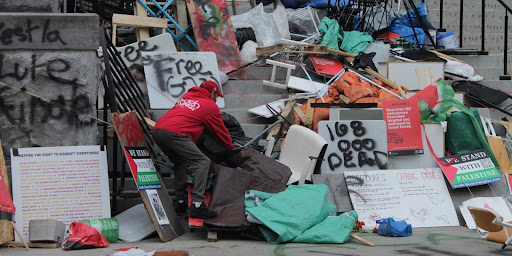After two and a half months, protestors at the University of Ottawa have chosen to voluntarily vacate the encampment on Tabaret Lawn. Student organizations leading the action made a joint Instagram post early Wednesday morning. It featured a video showing people dismantling camp supplies and laying banners, chairs, tent poles, discarded boards and more on the steps of Tabaret Hall.
Over the course of the two month protest, organizers of the encampment had been meeting with University of Ottawa administration to negotiate the disclosure of the institution’s entire investment portfolio and the divestment from entities that support Israel.
Israel has likely killed more than 186,000 Palestinians, according to research published last week in the Lancet.
Bargaining had hit a dead end by July 4, according to a post by the Palestinian Youth Movement, INSAF, and other organizations leading the protest.
The final act by encampment participants shows students will continue to pressure the university to meet divestment demands.
“The University of Ottawa administration does not deserve one moment of peace as long as they continue to invest in the genocide of our people and the occupation of our homeland,” an anonymous protestor says in Wednesday’s Instagram video.
LISTEN: How Palestine is a labour issue and how student unions and labour issues intersect
Jacques Fremont, president of the University of Ottawa, said in a statement that Tabaret Lawn was left in deplorable state.
“We condemn the acts of vandalism committed by the demonstrators before leaving the site, which add to the already considerable damage around Tabaret since the encampment was set up and continue to generate huge costs for the university,” Fremont said.
The Wednesday video posted by students stated school administration would not enjoy a “single penny” from their “genocidal investments.”
“Every dollar you make off the blood of Palestinians will be lost as we continue to confront you,” the anonymous organizer says.
The encampment was part of a broader movement across Canada and the United States. Inspired by a similar protest at Columbia University, other encampments had been set up at McGill, the University of Toronto and more.
In a June 10 speech to the school’s senate, Fremont expressed concern about the state of negotiations with encampment organizers.
“A negotiation is an exercise where there has to be some give-and-take in order to find a rightful solution,” Fremont said in his speech. “The parties must want to find a solution and eventually be ready to compromise.”
“The University of Ottawa appears to remain steadfast in only one thing: their commitment to investing in crimes against humanity,” Sumayya Kheireddine, student leader of the encampment, said in a statement on Wednesday.
The university had made numerous proposals to students, Fremont said. Proposals included the offer to disclose its up-to-date list of holdings as of June 1st, to give serious consideration to human rights issues in its holdings and to set up special scholarships for Palestinian students.
“Our proposals were dismissed without notice on Instagram, saying that they were ‘laughable,’” Fremont said in his June 10 speech.
The June 3 post mentioned by Fremont bemoans the lack of divestment proposals from the university. Divestment is a key demand of the protestors, who would commonly break out in the chant, “Disclose. Divest. We will not stop. We will not rest.”
“We reached an impasse in negotiations as the direct result of the university claiming they had zero powers to do anything about the funds they manage and in fact do have full control over,” Kheireddine said in Wednesday’s statement. “At best, this university and President are out of touch with reality. At worst, they are simply cruel, and only guided by greed and immune to the suffering of others.”
We hope you enjoyed this article. rabble.ca has never hid behind a paywall because we believe stories like this one are important to be accessible to everyone. As a result of this, we rely on reader support to help fund the work that we do. rabble.ca is currently running our summer fundraiser – will you join the team of rabble rousers who ensure important stories like this one remain free and accessible to all? Click here to support rabble today.



